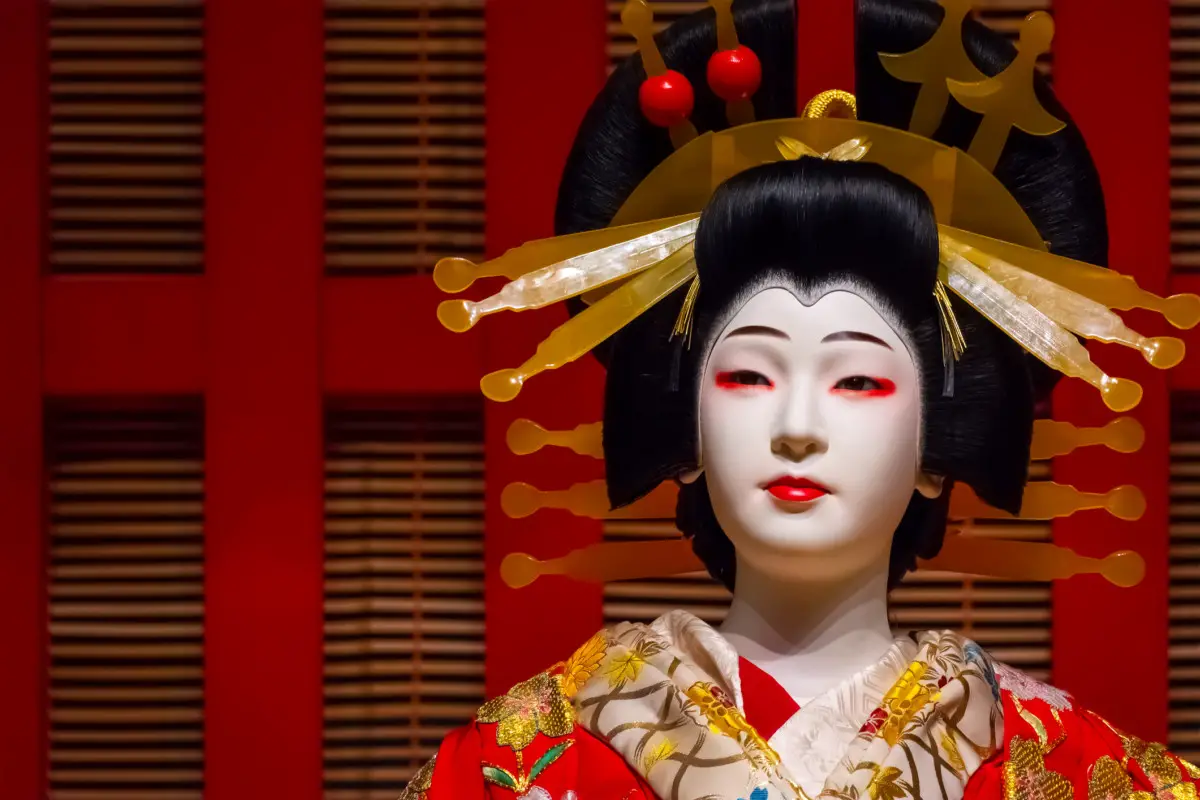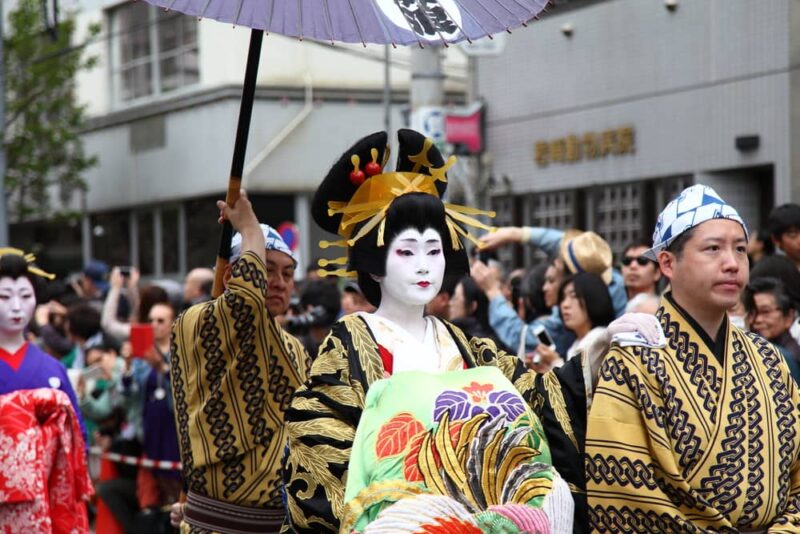
“A procession of oiran at Yoshiwara”, c. 1920. Old TokyoOld Tokyo
What is an Oiran History of an oiran Hairstyle of an oiran Clothing of an oiran Makeup of an oiran Oiran Ladies Walk (Oiran Dochu parades) What is a Geisha History of the Geisha Different types of Geisha Hairstyle of a Geisha Clothing of a Geisha Makeup of a Geisha

Japanese Oiran Differences with Geisha and Where to Experience JP SMART MAGAZINE
Oiran, Masters of the Floating World Oiran (花魁, the kanji could be translated as "the flower ahead of others" but it's said that the name actually originates in a shortened version of oira no tokoro no neesan, or "our place's older sister") is a historical figure from Japan's Edo period, known as the the crème de la crème of the courtesan world.

Oiran 1, a photo from Tochigi, Kanto TrekEarth Japan culture, Geisha art, Japanese culture
Characteristics Race Human Gender Female Hair Color Black Eye Color Bronze Affiliation Affiliation Tokito House Occupation Oiran Personal Status Status Active (Pre-Timeskip) Deceased (Post-Timeskip)

おいらん道中 (Oiran) Japan photography, Japanese beauty, Kabuki costume
What Is an "Oiran" An oiran was a courtesan in the red-light distinct "Yoshiwara" during Japan's Edo period. A high ranking courtesan is called "tayu." The Yoshiwara red-light district was located around Nihonbashi Bridge in Tokyo and it was one of the most gorgeous areas in the Edo period.

Oiran procession Japanese outfits, Japanese traditional clothing, Japanese geisha
Oiran (花魁) refers to the highest-ranked female prostitute in the Yoshiwara Yukaku (a red-light district.) It means "courtisane" in French and "cortigiana" in Italian. Oiran and Yukaku

Video What is a Japanese oiran walk? TravelAndLook
Published Dec 13, 2021 Koinatsu Oiran was introduced in Episode 2 of the Entertainment District Arc. After watching the latest episode, Demon Slayer anime fans wonder who is an "Oiran." Well,.

Courtesan Procession in Shinagawa • Meanwhile in Japan
Oiran (花魁) are the highest ranked sex workers in the Yoshiwara yuukaku (吉原遊廓). Yoshiwara is an area that is now known to be near Nihonbashi (日本橋). Yuukaku was the government-confirmed block for sex workers. Among all the sex workers there, the oiran was the highest ranked sex worker. 2.

OIRAN KIMONO Oiran costumes on display at the Oiran Dochu Annual Parade in Japan
Oiran was a kind of 'woman of pleasure' of the Edo period (1600~1868) in Japan. Unlike common street prostitutes, oiran were glamorous courtesans, who were cultivated in the traditional Japanese arts, the classics, calligraphy, tea ceremony, waka poetry, the shamisen (Japanese harp), and the game of go. This made them primarily entertainers.

OIRAN DOCHU おいらん道中 Japanese traditional clothing, Japanese traditional, Japanese culture
Oiran is the Japanese name for women who engage in sex work in Japan. Oirans would work in yukakus, which functioned similarly to brothels while regulated by the government. Not just any woman could be classified as an oiran. However, only the most elite and cultured women would earn that distinction.

Oiran 14 Kimono design, Geisha, Oiran tayuu
Ready to shop and save? Explore amazing deals on the Temu App. Free shipping & return. Discover unbeatable deals and discounts on the Temu App. Download Now & Save Big!

Who Were The Oiran In Japan And Do They Still Exist Today?
Attire. The differences between Geisha, Maiko, and Oiran can also be noted in their attire. Maikos wear brightly colored long sleeve kimonos with extravagant patterns. Their hair is adorned with a multitude of colorful hair ornaments (known as "kanzashi") and they wear high wooden sandals, called okobo.

Pin by Sharon RiceWeber on Oiran and Tayuu Japanese geisha, Japanese costume, Japanese kimono
What Is An Oiran? In entertainment districts, an Oiran was the highest-ranking prostitute in a brothel. These women were extremely beautiful and cultured and held a higher social rank than other prostitutes and customers. Given their position in the hierarchy, it was often that the Oiran would choose their customers, not the other way around.

Oiran Dochu Procession in Asakusa Tokyo Cheapo
Oiran Dochu is a reenactment of a procession from the Edo period (1603-1867) with men and women dressed up in Edo period costumes. The parade ends with a meeting between the tayu (senior most oiran) and her customer. Oiran, skilled in many art forms, are high-class courtesans, who enjoyed the status of celebrities during the Edo Period.

What you need to know about Oiran Dochu fromJapan
Oiran vs Geisha (Prostitute vs. Artist) During the Edo Period, there were courtesans working arm-in-arm with geisha at the same entertainment districts. They were called Tayū ( 太夫 ) and Oiran ( 花魁 ).Tayu was the high-ranked courtesans, dressed in amazingly flashy kimonos and wearing heavy hairstyles.

Oiran 13 by nicojay on DeviantArt
Oiran ( 花魁) is a collective term for the highest-ranking courtesans in Japanese history, who were considered to be above common prostitutes (known as yūjo ( 遊女, lit. 'woman of pleasure')) for their more refined entertainment skills and training in the traditional arts. Divided into a number of ranks within this category, the highest.

Tina Travels Oiran Makeover Unique Travel Experiences in Kyoto, Japan
The Geta (shoes) Both Geisha and Oiran ladies walk around the town with Japanese wooden geta shoes, but what differs both is the heels. The geta worn by a Geisha is usually low-heeled and flat; not much different than the other geta worn by Japanese people in general. However, the geta worn by an Oiran is usually high-heeled; usually the height.